Related Research Articles
The Book of Genesis is the first book of the Hebrew Bible and the Christian Old Testament. Its Hebrew name is the same as its first word, Bereshit. Genesis is an account of the creation of the world, the early history of humanity, and the origins of the Jewish people.

Isaac is one of the three patriarchs of the Israelites and an important figure in the Abrahamic religions, including Judaism, Christianity, and Islam. Isaac first appears in the Torah, in which he is the son of Abraham and Sarah, the father of Jacob and Esau, and the grandfather of the twelve tribes of Israel.

Jacob, later given the name Israel, is regarded as a patriarch of the Israelites and is an important figure in Abrahamic religions, such as Judaism, Samaritanism, Christianity, and Islam. Jacob first appears in the Book of Genesis, originating from the Hebrew tradition in the Torah. Described as the son of Isaac and Rebecca, and the grandson of Abraham, Sarah, and Bethuel, Jacob is presented as the second-born among Isaac's children. His fraternal twin brother is the elder, named Esau, according to the biblical account. Jacob is said to have bought Esau's birthright and, with his mother's help, deceived his aging father to bless him instead of Esau. Later in the narrative, following a severe drought in his homeland of Canaan, Jacob and his descendants, with the help of his son Joseph, moved to Egypt where Jacob died at the age of 147. He is supposed to have been buried in the Cave of Machpelah.
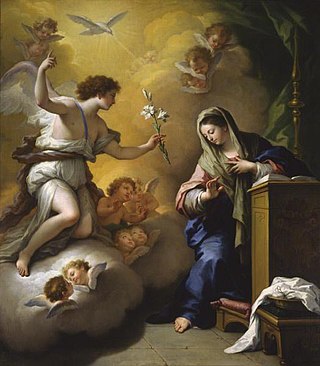
Archangels are described as the second-lowest rank of angel in De Coelesti Hierarchia written by Pseudo-Dionysius the Areopagite in the 5th or 6th century. The Bible itself uses the term very rarely, with no mention in the Old Testament, and does not mention a hierarchy of angels in any detail. The word is usually associated with the Abrahamic religions; similar beings exist in several other religions.

Enoch is a biblical figure and patriarch prior to Noah's flood, and the son of Jared and father of Methuselah. He was of the Antediluvian period in the Hebrew Bible.
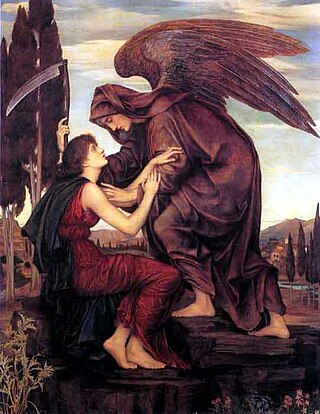
Samael is an archangel in Talmudic and post-Talmudic lore; a figure who is the accuser or adversary, seducer, and destroying angel.
Yaqub ibn Ishaq ibn Ibrahim ibn Azar, later given the name Israil, is recognized by Muslims as an Islamic prophet. He is held to have preached the same monotheism as his forefathers: Abraham, Ishmael, and Isaac.
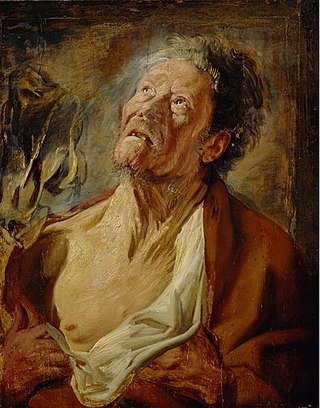
The Testament of Job is a book written in the 1st century BC or the 1st century AD. The earliest surviving manuscript is in Coptic, of the 5th century; other early surviving manuscripts are in Greek and Old Slavonic.

The Testaments of the Twelve Patriarchs is a constituent of the apocryphal scriptures connected with the Bible. It is believed to be a pseudepigraphical work of the dying commands of the twelve sons of Jacob. It is part of the Oskan Armenian Orthodox Bible of 1666. Fragments of similar writings were found at Qumran, but opinions are divided as to whether these are the same texts. It is generally considered apocalyptic literature.

A Christophany is an appearance or non-physical manifestation of Christ. Traditionally the term refers to visions of Christ after his ascension, such as the bright light of the conversion of Paul the Apostle.

Lech-Lecha, Lekh-Lekha, or Lech-L'cha is the third weekly Torah portion in the annual Jewish cycle of Torah reading. It constitutes Genesis 12:1–17:27. The parashah tells the stories of God's calling of Abram, Abram's passing off his wife Sarai as his sister, Abram's dividing the land with his nephew Lot, the war between the four kings and the five, the covenant between the pieces, Sarai's tensions with her maid Hagar and Hagar's son Ishmael, and the covenant of circumcision.
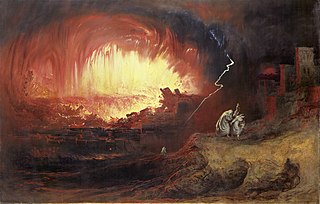
Vayeira, Vayera, or Va-yera is the fourth weekly Torah portion in the annual Jewish cycle of Torah reading. It constitutes Genesis 18:1–22:24. The parashah tells the stories of Abraham's three visitors, Abraham's bargaining with God over Sodom and Gomorrah, Lot's two visitors, Lot's bargaining with the Sodomites, Lot's flight, the destruction of Sodom and Gomorrah, how Lot's daughters became pregnant by their father, how Abraham once again passed off his wife Sarah as his sister, the birth of Isaac, the expulsion of Hagar, disputes over wells, and the binding of Isaac.

Toledot, Toldot, Toldos, or Toldoth is the sixth weekly Torah portion in the annual Jewish cycle of Torah reading. The parashah tells of the conflict between Jacob and Esau, Isaac's passing off his wife Rebekah as his sister, and Isaac's blessing of his sons.

Vayishlach or Vayishlah is the eighth weekly Torah portion in the annual Jewish cycle of Torah reading. In the parashah, Jacob reconciles with Esau after wrestling with a "man." The prince Shechem rapes Dinah, whose brothers sack the city of Shechem in revenge. In the family's subsequent flight, Rachel gives birth to Benjamin and dies in childbirth.
The Testament of Abraham is a pseudepigraphic text of the Old Testament. Probably composed in the 1st or 2nd century AD, it is of Jewish origin and is usually considered to be part of the apocalyptic literature. It is regarded as scripture by Beta Israel Ethiopian Jews, but not by any other Jewish or Christian groups. It is often treated as one of a trio of very similar works, the other two of which are the Testament of Isaac and Testament of Jacob, though there is no reason to assume that they were originally a single work. All three works are based on the Blessing of Jacob, found in the Bible, in their style.
The Testament of Isaac is a work now regarded as part of the Old Testament apocrypha. It is often treated as one of a trio of very similar works, the other two of which are the Testament of Abraham and Testament of Jacob, though there is no reason to assume that they were originally a single work. All three works are based on the Blessing of Jacob, found in the Bible, in their style.
In Judaism, angels are supernatural beings that appear throughout The Tanakh, rabbinic literature, apocrypha and pseudepigrapha, Jewish philosophy and mysticism, and traditional Jewish liturgy as agents of the God of Israel. They are categorized in different hierarchies. Their essence is often associated with fire. The Talmud describes their very essence as fire.
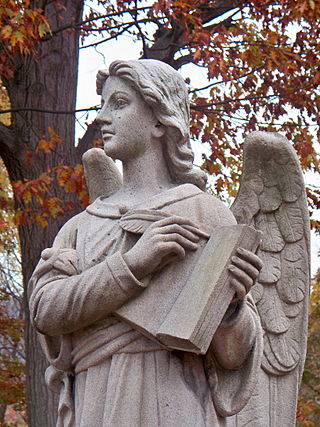
Recording angels are angels in Judaic, Christian, and Islamic angelology. Recording angels are assigned by God with the task of recording the events, actions, and prayers of each individual human. These include bad sins and good deeds.

The Prayer of Joseph is a pseudepigraphic writing of the Old Testament. It was composed either in Aramaic or in Greek in the 1st century AD. The text is almost lost and only a few fragments have survived in ancient quotations concerning the Biblical patriarch Jacob. The Prayer of Joseph narrates that Jacob was the incarnation of the angel Israel who competed with Uriel over their rank in heaven.
References
- ↑ Stone, Michael E. (1991). Selected Studies in Pseudepigrapha and Apocrypha: With Special Reference to the Armenian Tradition. BRILL. pp. 112–123. ISBN 978-90-04-09343-0.
- ↑ DiTommaso, Lorenzo; Henze, Matthias; Adler, William (2017-11-27). The Embroidered Bible: Studies in Biblical Apocrypha and Pseudepigrapha in Honour of Michael E. Stone. BRILL. p. 289. ISBN 978-90-04-35721-1.
- ↑ Early Jewish Writings website, Testament of Jacob
- ↑ Scribd website, Testament of Jacob document